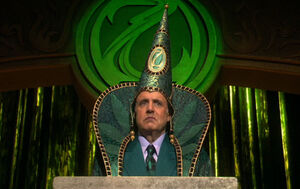On the bright side, maybe there’s a high level government job waiting for him.
Chris Flowers: One Hit Wonder?

These days it is a pretty sure bet that Chris Flowers regrets telling investors in his private equity funds that "every single investment" would make money. His largest fund is said to be down between 60% and 70%, and some secondary market buyers assign shares in it no value at all.
William Cohan has an extraordinary piece in Fortune on the rise and fall of Flowers, the former Goldman Sachs wonderboy (once the youngest partner ever) who became one of the biggest names in banking by buying Japan’s Shinsei bank for $1 billion in 2000 and IPOing it four years later for $10 billion. But these days his reputation is under fire as the banking system tries to recover from the ruinous 2008.
"He did one great assisted transaction in Japan," one unnamed banker tells Cohan, "and off that he raised $7 billion. The great failing in private equity is to assume that you can repeat the past. I think he just assumed, for instance, he could repeat Shinsei over in Germany. Big mistake."
That person is referring to the $1.5 billion tender offer Flowers big fund made to acquire 24.9% of Hypo Real Estate Holding, a Munich-based commercial real estate lender. Flowers paid a 25% premium to where the shares were trading before the deal was announced. Just four months later Hypo had to turn to the German government for assistance. The German government ended up owning 90% of Hypo, drastically diluting Flowers’ stake. These days his investment in the bank has probably dropped in value by 87%.
But what may have hurt Flowers’s reputation even more than his investment losses is the role he played in Bank of America’s acquisition of Merrill Lynch. Flowers, while at Goldman Sachs, had helped put together the merger of NationsBank and Bank of America. In early 2008, when Merrill looked to raise capital, Flowers poured through its books but concluded the asking price was too high. But when the crisis hit on September 11, Flowers found himself back at Merrill as an adviser to Bank of America.
Flowers issued a "fairness opinion" on the deal, endorsing the 70% premium Bank of America paid for the shares of Merrill Lynch. He was repeatedly invoked in the press conference announcing the deal. Ken Lewis, Bank of America’s CEO, explained that Flowers had concluded that under fellow Goldman Sachs alum John Thain’s leadership Merrill had improved to the point that it now had "a much lower risk profile" than it had the year before under Stan O’Neal. Flowers was paid around $10 million for his role, with another $10 million going to an advisory firm in which he is part owner.
Of course, that deal–especially the price paid–is now widely regarded as disastrous.

But it would be fair enough to ask the question the other way around: Is Flowers’ much-heralded financial acumen perhaps not very useful in determining the underlying value of banks? Were we all fooled by randomness into thinking that there was real magic behind his Wall Street wizardry?
See Also:
Rumor: JC Flowers May Invest In Bank of America


